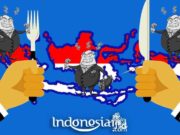The month of Ramadan is coming soon, many mothers are getting ready to shop in preparation for a month that is considered holy for Muslims. Many children rejoice in the shorter school times and longer play times. But that is not what happened to, say A, as a non-majority religious member, he participated in shopping for a lot of necessities before the fasting month, especially frozen foods and various instant foods.
In fact, with a young pregnancy, she should eat more healthy foods and vegetables. But what can he say, during the fasting month, many food stalls near the office where he usually buys food are prohibited from opening. The same thing happened to N as a woman who is Muslim and also fasted and also expressed the difficulty of finding a place to eat that could be accessed during the month of Ramadan because as a woman she did not fast for a whole month. There are times when menstruation causes N to not fast and because she has to work full time she does not have time to cook and there are very few food stalls that can be accessed during the fasting month.
Ramadan is a month full of discrimination in Indonesia, especially after entering the reform era. Women, the elderly and non-Muslim religious groups are ‘forced’ to follow the rules that bind men regardless of their conditions. And worse, this regulation is carried out by the state. At least there are some regions that prohibit food stalls from selling during fasting time. Police and mass organizations often enforce control and closure.
In 2016, four regions were evaluated for this discriminatory policy, namely: Serang, Sumenep, Banten and Aceh. Regional autonomy that was developed during the reform period made various regions implement regulations based on populism. Populism in politics is closely related to the identity of certain groups and by the time of the political year, religion has become the main commodity to be traded. Women, the elderly and other minority groups are marginalized as a result of democracy that takes sides with the majority. And in the month of Ramadan, is the month when the marginalization can be seen clearly.
Spirituality and Religiosity
In principle, the month of Ramadan is a month in which Muslims around the world practice fasting not only withholding food and drinking but overall lust: appetite for food and drink, lust for sex, lust for power. They focus on forming their spiritual relationship with Allah SWT through a series of obligatory prayers and sunnah in this special month. Ramadan is the month when Muslim humans are required to suppress egoism and be more concerned with social conditions such as economic inequality through charity, train socio-personal skills with emotional control by fasting. Unfortunately, rituals in the month of Ramadan which are personal but have a social impact like these are celebrated by the state. The state, especially with political power, wants to take part in taking advantage of the good moon moment by making the practice of worship a political commodity.
There are two understandings about spirituality and religiosity throughout the history of religion and society. Religion and spirituality are often seen as a unity as well as separation. The idea of separating the concepts of religion and spirituality was known after the 19th century when modern ideologies emerged and the formation of national and state consciousness. Religion was eliminated and the state emerged based on the principles of modern ideology.
Adherents of religion do not become extinct when religion becomes less important in society. On the contrary, they try to adapt religious teachings to the course of world politics. Updates in Catholicism, church reform and Islamic modernization exist as an effort for religion to adapt to a changing world. One thing that is being done is to present the concept of secularism in which the state tries to separate itself from religion because religion is considered to be slow to respond to a changing society both in terms of political, social and economic structures. Religion, is considered to fail to adapt to humanity and equality in a global society.
The presence of secularism and separating the concepts between spirituality and religiosity. Secularism provides a means for religion to survive in modern society and the people who practice it are guaranteed by the state. Religion or religion is seen as a pattern of values, beliefs, symbols, behaviors and experiences that are institutionalized, which are directed at spirituality, are known together in society, and are passed down through tradition. In a study conducted by Yulmaida Amir and Diah Rini Lesmawat entitled “Religiosity and Spirituality: Same or Different Concepts” comparing the various definitions of the two concepts. Religiosity is considered to be formal and institutional because it reflects a commitment to beliefs and practices according to tradition (religion). in particular, while spirituality is associated with personal experiences and is functional, reflects an individual’s efforts to obtain purpose and meaning in life.
Meanwhile, in the context of Indonesian history, the state has carried out secularization during the New Order government and later during the reform era, the Islamic power which was inspired by the Iranian revolution showed its strength. As a third world country that has been colonized, Indonesia provides a political style to oppose anything indicated by using English because it is considered part of the West and Colonial then adapting Islam and the legacy of Pancasila as an ideology that can be adopted legally and legally by the state. And through the regional autonomy policy, Islam has become an ideology that is implemented in sharia.
The failure of Islamic reform by the State
Islamic Sharia as a show of Islamic strength in the country comes through a series of regional regulations in the month of Ramadan which restore the religious spirit that was worn out and left behind hundreds of centuries ago. Islam was referred to in the 7th century when humans who were considered essential were only men who came from aristocrats or traders. Outside these categories, women, slaves and non-Muslims are considered not essential, not legal subjects.
Islamic law in the form of sharia is applied in regional regulations in the month of Ramadan made without adjusting the context today where all humans have the same basic rights to survive, continue life and respect as humans. The gender equality movement, the abolition of slavery, and the free market economy were forced to adjust the legal structure of society hundreds of years ago. Rules for food stalls are prohibited from opening in the month of Ramadan, changes in office working hours and various benefits are made with the view that women are not considered as citizens and are also legal subjects. The prohibition of going out at night or the imposition of using religious attributes specifically for women is a form of discrimination because it is applied in this day where society has changed considerably.
And the religion of Islam which is adapted by the Indonesian state today is a religion with outdated interpretations. Because the obsolete interpretation has three characteristics, namely simple, clingy and rigid. Fatwas that are popular and become the talk of the media are fatwas that have these three characteristics and were popularized by Islamic scholars who are deprived of Islamic history both globally and locally. Take for example how popular the fatwa going to hell is when drinking coffee at Starbuck or how polygamy can cause women to go to heaven. It gets worse when the state tries to adapt rigid fatwas to legal regulations: banning the sale and distribution of alcoholic beverages, penalties for victims of rape and prostitution, exclusion for atheists.
The state has failed reform in Islam if it does not look at the dynamics of Islamic studies. Because the results of Islamic studies conducted by most Islamic researchers are critical. And the adaptation of religion to the state is disastrous. Religiosity intercourse with state power becomes anti-criticism because it has received divine legitimacy. Any serious and complex study of Islamic reform will be rejected because it is considered ‘impure’. Meanwhile, the conservative interpretation that has been adapted as a basis for state regulations today is blind to humanitarian goals. We are keeping religion away with a spirit of renewal that upholds equality in a global society.
Source : dw































